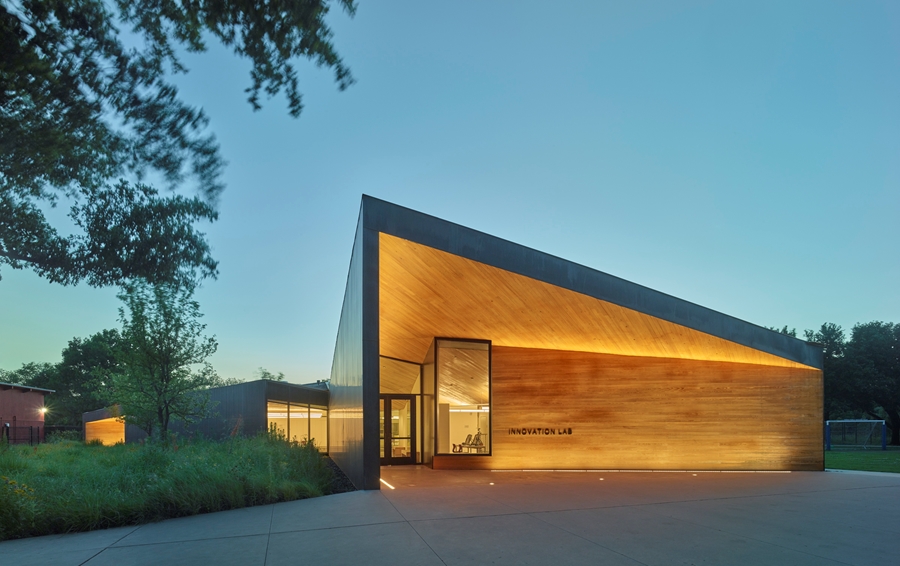The Pryor Center Presents lecture series continues with Marlon Blackwell, FAIA, Distinguished Professor and the E. Fay Jones Chair in Architecture in the Fay Jones School of Architecture and Design, at 6 p.m., Thursday, Oct. 14, as he presents "Abstract Unions" at The David and Barbara Pryor Center for Arkansas Oral and Visual History in the Fulbright College of Arts and Sciences. The series is part of the Pryor Center's expanded mission of education, research and outreach.
Tickets to the event are free, but seating is limited and reservations are required. Masks will also be required for attendees.
Blackwell, working outside the architectural mainstream, will discuss his architecture and design process as being based in design strategies that draw upon vernaculars, building typologies and the contradictions of place - strategies that seek to transgress conventional boundaries for architecture.
Rather than a removal from reality, abstraction is the process of connecting to place, looking for possibilities of maximum meaning with minimal means. Blackwell will demonstrate how these ideas of reinterpreting the familiar are generated from careful observations of intersections of nature-made and culture-made conditions particular to an architectural situation.
Using examples of selected design works from his firm, Marlon Blackwell Architects, he will speak to a resilient architecture that can be achieved as interplay between details, form and place. In particular, Blackwell will illustrate the necessity of being responsive to environmental factors, the specificities of site and sustainable design principles that ultimately provide an architecture that can be felt as much as it is understood, as immediate and tactile as it is legible, contributing to the fundamental civic dignity of communities.
Blackwell is a lifetime member of the American Academy of Arts and Letters. He was a 2019 William A. Bernoudy Architect in Residence at the American Academy in Rome, inducted into the National Academy of Design in 2018 and selected as a United States Artists Ford Fellow in 2014. Blackwell received the E. Fay Jones Gold Medal from the Arkansas AIA in 2017 and the 2012 Architecture Prize from the American Academy of Arts and Letters. He is the recipient of the 2020 AIA Gold Medal, the institute's highest honor, which recognizes those whose work has had an enduring impact on the theory and practice of architecture.
Blackwell is a practicing architect in Fayetteville. Work produced in his professional office has received national and international recognition with significant publication in books, architectural journals and magazines and more than 160 design awards. His firm received the 2016 Cooper Hewitt National Design Award in Architecture and ranked No. 1 in Design as part of the 2016 Architect 50.
A monograph of Blackwell's early work An Architecture of the Ozarks: The Works of Marlon Blackwell was published in 2005 by Princeton Architectural Press, who will also publish a new monograph titled Radical Practice to be released in Fall 2022.
Upcoming Pryor Center Presents
Nov. 4 — "City in the Woods: John Cooper, Sr., Cherokee Village, Arkansas, and the Founding of the American Retirement Community" — Presented by Stephen Luoni, Distinguished Professor of Architecture, Steven L. Anderson Chair in Architecture and Urban Studies and director of the U of A Community Design Center. Luoni will talk about the early retirement community industry, focusing on Cherokee Village in the Ozark foothills.
Dec. 2 — "Psychological Distress During the COVID-19 Epidemic: The Effects by Race, Ethnicity, and Class" — Presented by Brittany N. Hearne, assistant professor in the sociology and criminology department at the U of A. This lecture will focus on research collected from nationally representative survey data and in-depth interview data collected in the Northwest Arkansas region during 2020. The findings reveal both national patterns of psychological distress across race/ethnicity and educational attainment and specific coping resources and strategies used by college-educated Black Arkansans to decrease distress.
About The David and Barbara Pryor Center for Arkansas Oral and Visual History: The David and Barbara Pryor Center for Arkansas Oral and Visual History is an oral history program with the mission to document the history of Arkansas through the collection of spoken memories and visual records, preserve the collection in perpetuity, and connect Arkansans and the world to the collection through the Internet, TV broadcasts, educational programs, and other means. The Pryor Center records audio and video interviews about Arkansas history and culture, collects other organizations' recordings, organizes these recordings into an archive, and provides public access to the archive, primarily through the website at pryorcenter.uark.edu. The Pryor Center is the state's only oral and visual history program with a statewide, seventy-five county mission to collect, preserve, and share audio and moving image recordings of Arkansas history.
About the Fulbright College of Arts and Sciences: The Fulbright College of Arts and Sciences is the largest and most academically diverse unit on campus with three schools, 16 departments and 43 academic programs and research centers. The college provides the majority of the core curriculum for all University of Arkansas students.
About the University of Arkansas: As Arkansas' flagship institution, the U of A provides an internationally competitive education in more than 200 academic programs. Founded in 1871, the U of A contributes more than $2.2 billion to Arkansas' economy through the teaching of new knowledge and skills, entrepreneurship and job development, discovery through research and creative activity while also providing training for professional disciplines. The Carnegie Foundation classifies the U of A among the top 3% of U.S. colleges and universities with the highest level of research activity. U.S. News & World Report ranks the U of A among the top public universities in the nation. See how the U of A works to build a better world at Arkansas Research News.
Topics
Contacts
William A. Schwab, executive director
Pryor Center
479-575-6829, bschwab@uark.edu
